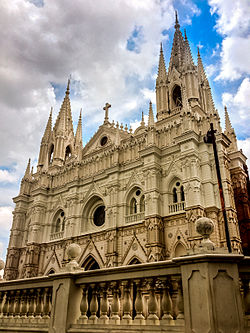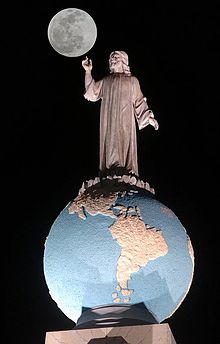Religion in El Salvador
Religion in El Salvador (2022 estimate)[1]

Christianity is the predominant religion in El Salvador,[2] with Catholicism and Protestantism being its main denominations. The Catholic share of the population is on decline while Protestants are experiencing rapid growth in recent decades.[3]
The Spanish Conquistador Pedro de Alvarado named part of the territory of modern day El Salvador after Jesus Christ - San Salvador (lit. "Holy Savior"). The territory's name, including the province of San Miguel, was later extended to the Provincia De Nuestro Señor Jesus Cristo, El Salvador Del Mundo (lit. 'Province of our Lord Jesus Christ, the Savior of the World'), shortened to the Republic of El Salvador, or Salvador, during the post-Federal Republic period and subsequently settled on as El Salvador.[4]
El Salvador is a secular country and the freedom of religion is enshrined in the nation's constitution. However, the constitution grants automatic official recognition to the Catholic Church and requires other religious groups to apply for official recognition through registration.[5]
Religious affiliation[edit]

According to the World Religion Database 2020, 96.68% of the population has a Christian background and 2.57% is non-religious (atheist or agnostic); 0.57% follow ethnic religions.[6]
There is some debate about percentages. The Institute of Public Opinion of the University of Central America in May 2017 found 47.5% of the population as Catholics, and 35.1% as Protestant, 14.5% as not having a religion and the remainder (about 3%) being Jehovah's Witnesses, International Society of Krishna Consciousness, Muslims, Jews, Baháʼís, Buddhists, Latter-day Saints, and members of indigenous religions.[7] However, Latinobarómetro in 2017 found 39% were Catholic, 28% Protestant, 30% atheist/agnostic/not religious, 2% other religions, and 1% did not answer.[8] It also found in 1996 that 67% of the population considered themselves Catholic and 15% Protestant.[8] A 2023 survey by M&R Consultores found that 43.5% of the population was affiliated with Protestantism, 36.2% with Catholicism and 19.3% with no religion.[9][10]
Protestant and other Christian denominations[edit]
Mision Cristiana Elim Internacional is a large pentecostal denomination started in El Salvador. It claims that its main church in San Salvador has 120,000 attending.[11] The Assemblies of God claim 285,226 members (2007).[12]
The Anglican Church in El Salvador (a diocese of the province of the Anglican Church in Central America) claims 6,000 members in 18 congregations.[13] The Baptist Association of El Salvador claims 4,427 members[14] and the Salvadorean Lutheran Synod about 15,000 in 68 congregations.[15]
The Church of Jesus Christ of Latter-day Saints, a Restorationist Christian denomination, claims 130,000 people in 164 congregations as of 2023),[16] or about 2% of the population, and has 1 temple in San Salvador. Latter-Day Saints began evangelizing in El Salvador in 1951.[16]
Religious freedom[edit]
The constitution of El Salvador provides for the freedom of religion and prohibits religious discrimination. Publicly offending others' religious beliefs or damaging religious objects is punishable by imprisonment. Members of the clergy may not hold senior government positions, and are forbidden from joining political parties.[17]
Religious groups may register with the government for the purposes of tax-exemption and acquiring building permits. Special visas are required for individuals who wish to travel to El Salvador to engage in proselytizing.[18]
Public school education is secular. Private schools may include religious content in their curricula, but do not receive government support.[19] Since 2016, clergy have limited access to prisons, due to concerns that some members of the clergy were using prison visits to smuggle items into prisons.[19]
In 2023, the country was scored 3 out of 4 for religious freedom by Freedom House, a US government funded think tank.[20]
See also[edit]
- Demographics of El Salvador
- Catholic Church in El Salvador
- The Church of Jesus Christ of Latter-day Saints in El Salvador
- Islam in El Salvador
- Judaism in El Salvador
References[edit]
- ^ José Simeón Cañas Central American University (UCA El-Salvador), 2022 report
- ^ "El Salvador 2022 report, US State Dept".
- ^ Stephen Offutt, New Centers of Global Evangelicalism in Latin America and Africa (Cambridge University Press, 2015) focuses on El Salvador the north central south America and South Africa.
- ^ El nombre oficial de la República de El Salvador (PDF). Gobierno de la República de El Salvador. 2015. ISBN 978-99923-0-274-3. Archived from the original (PDF) on 11 November 2020. Retrieved 6 September 2020.
- ^ "El Salvador 2022 report, US State Dept".
- ^ World Religion Database, retrieved 2023-08-03
- ^ "International Religious Freedom Report for 2017: El Salvador". www.state.gov. Retrieved 31 December 2018. For percentages it cites the Institute of Public Opinion of the University of Central America May 2017 survey.
- ^ a b "Latinobarómetro 1995 - 2017: El Papa Francisco y la Religión en Chile y América Latina" (PDF) (in Spanish). January 2018. Retrieved 23 August 2018.
- ^ https://www.el19digital.com/app/webroot/tinymce/source/2023/AGOSTO/16Ago/ENCUESTA/encuesta.pdf
- ^ https://jpmas.com.ni/catholic-believers-decline-in-central-america/
- ^ "Células". Elim Mision Cristiana. Retrieved 26 April 2015.
- ^ Triplett, Don. "King's Castle 24/7 Prayer Fortress". Assemblies of God World Mission. Retrieved 26 April 2015.
- ^ "Iglesia Anglicana de El Salvador". Retrieved 26 April 2015.
- ^ "Baptist Association of El Salvador". World Council of Churches. January 1991. Retrieved 26 April 2015.
- ^ "Salvadorean Lutheran Synod". World Council of Churches. January 1991. Retrieved 26 April 2015.
- ^ a b "El Salvador". Newsroom. The Church of Jesus Christ of Latter-day Saints. Retrieved 28 November 2023.
- ^ "El Salvador 2022 report, US State Dept".
- ^ "El Salvador 2022 report, US State Dept".
- ^ a b International Religious Freedom Report 2017 El Salvador, US State Department, Bureau of Democracy, Human Rights, and Labor.
- ^ Freedom House, retrieved 2023-08-03
Further reading[edit]
- Stephen Offutt, New Centers of Global Evangelicalism in Latin America and Africa (Cambridge University Press, 2015) focuses on El Salvador and South Africa. online review
External links[edit]
 Media related to Religion in El Salvador at Wikimedia Commons
Media related to Religion in El Salvador at Wikimedia Commons

